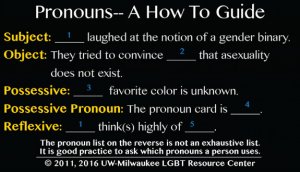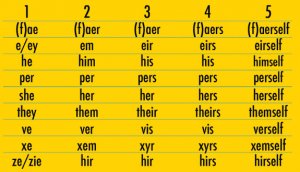Back in the day, use of the masculine form did not necessarily exclude women. If you wrote, "If you see someone who needs help, you should try to help him. He may be inspired to help someone else." It was understood that "him" and "He" did not pertain exclusively to males.
Perhaps because of sociologic pressures, writers amended their sentences: "If you see someone who needs help, you should try to help him/her. (S)he may be inspired to help someone else.
Many writers felt this construction to be awkward, and now we see "If you see someone (singular) who needs help, you should try to help them (plural). They (plural) may be inspired to help someone else."
Though I think understand the reasoning behind using a plural reference for a single person, it just sounds wrong to me in the same way that hearing the song "Misty" played in the key of C sounds wrong to me. My understanding of using "they" instead of "he" or "she" is the gender neutrality as it has been explained to me, since there are so many shades of gender recognized today that fall on some sort of spectrum between the extremes of "male" and "female". The same explanation has come from a number of younger folk who are "in the loop" on all these trends today, so if this is completely (or even partially) false, I would certainly appreciate hearing the "real deal" on this.

Misty was the first tune I learned to arrange and play in a cocktail style on the piano, and I did it in the same key I have usually heard it - either Eb or Bb because those are the keys horn players are most comfortable in and therefore the way the Real Book (any jazz type musicians here will know what I am referring to) has it. Because I learned to play that tune, and have done it so often, my ears got used to it in these particular keys. I once heard a fingerstyle guitar player do it in C, and it just didn't sound right to me. I still play it in either Eb or Bb on the guitar because I was fortunate to not have gotten stuck with the idea of "easy" and "hard" keys, which is a very unfortunate musically limiting way to be taught on either piano or guitar. To me, they are all equal. To me, music is a HEARING art, first and foremost, so that is what I related to most - what I hear. Misty has been done in a number of keys because various singers have different ranges that need to be accommodated, so I am referring to hearing the tune instrumentally.
Anyway, I am so used to there being singular and plural the way I learned to use these, that when a plural pronoun is used to refer to a single entity, it just sounds wrong to me. This doesn't really bother me, but instead I just notice it as being somehow out of place. There are phrases that do grate on me such as people saying "so I'm like...and then she goes...and then I'm like wow...". That started with the stupid movie "Valley Girls" though people in the Valley apparently started talking in that manner, fortunately after I was long gone. Anyone who grew up in the Valley (San Fernando Valley) knows of that silly stereotype of the dumb blond rich girl, which that movie apparently portrayed. As with many stereotypes, it is unfair to those it is applied to. Somehow, those phrases caught on and even my younger brother, the attorney says those things, as well educated as he is. But, then, he does still live in the Valley not far from where we grew up.

Tony



